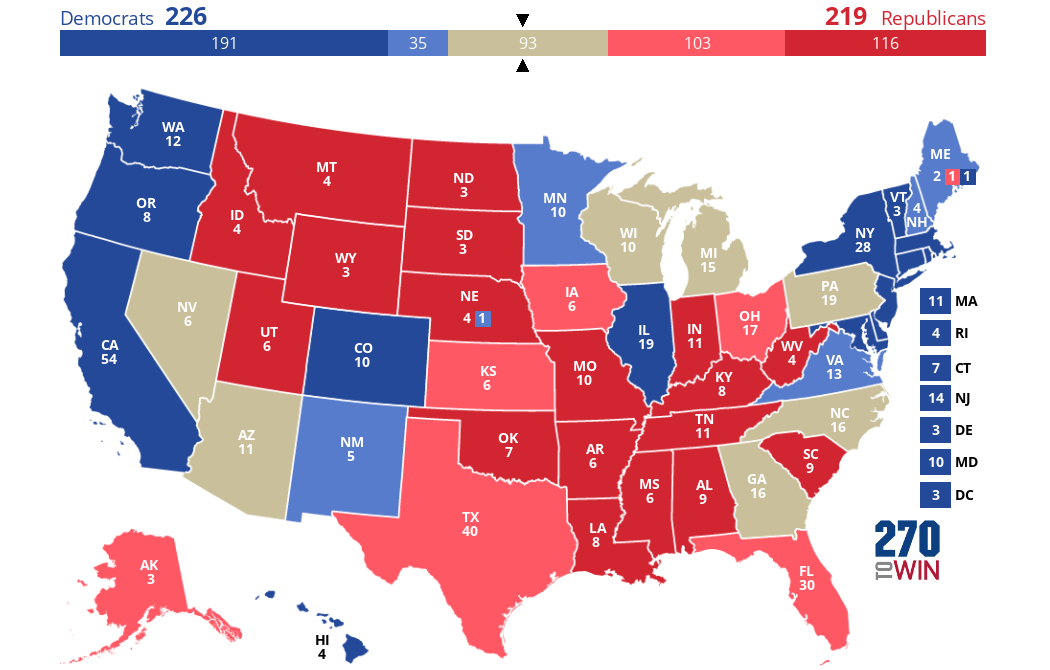
The Western Journal's Guide to the 2024 Election: Everything You Need to Know
This year has been one of the most eventful presidential election years of all time.
The sitting president dropped out of his re-election campaign just months before the election and was then replaced by a candidate who hadn’t won a single primary vote.
We saw the representative of the other party face an unprecedented campaign of lawfare, slander and violence, including two assassination attempts.
Now, we all just want to know who is going to win: Vice President Kamala Harris or former President Donald Trump.
As the numbers begin to roll in on Tuesday, if you don’t know what to look out for, it may just sound like a whole lot of nonsensical electoral jargon.
So, here’s your guide to the election.
Battleground States and Potential Flips
The seven battleground states of 2024 (shown in the graphic below) are as follows (ordered by total number of electoral votes): Pennsylvania (19 votes), Georgia (16 votes), North Carolina (16 votes), Michigan (15 votes), Arizona (11 votes), Wisconsin (10 votes) and Nevada (6 votes).

If you want to know how many paths to victory there are for Trump based on which swing states he could pick up, read here.
Essentially, whoever wins the right combination of those seven states — bringing their electoral count total to 270 or above — will win the election.
Other states to look out for are the lean-red and lean-blue states. Those include six lead-red states — Texas (40 votes), Florida (30 votes), Ohio (17 votes) Iowa (6 votes), Kansas (6 votes) and Alaska (3 votes) — and five lean-blue states — Virginia (13 votes), Minnesota (10 votes), New Mexico (5 votes), New Hampshire (4 votes) and Maine (4 total votes split between three congressional districts).
If either candidate begins losing those states, it will get incredibly difficult for them to win.
We Won’t Have All the Results on Tuesday
Don’t expect to have all your questions answered on Tuesday. Not all of the election results will be posted by the end of the day.
Former Justice Department attorney J. Christian Adams explained as much in an Op-Ed for The Western Journal on Sunday.
“Michigan Secretary of State Jocelyn Benson has already said the state won’t know its election results until the day after the election. Maricopa County election officials have warned it will take them 10 to 13 days to count all the ballots,” Adams wrote.
“The AP is already cautioning that highly competitive races in Nevada may not be able to be called on Election Night. Pennsylvania Secretary of State Al Schmidt has told voters to not expect results on Election Day.”
No One Knows How This Will Play Out … But There Are Some Promising Signs for Trump
As noted by Ezra Klein in an Oct. 13 Op-Ed, polls in the last two presidential elections were off by a roughly five-point margin in individual states.
In most cases, these misses were underestimates of Trump’s performance. If this year’s polls similarly underestimated Trump’s success, he will undoubtedly win the 2024 election.
However, there’s also a chance pollsters will not make the same mistake three times in a row.
Klein also noted in his piece that “[p]ollsters are desperate to avoid the mistakes they made in 2016 and 2020” and have adjusted their polling methods in order to make that happen.
Yet still, some believe this year’s results will show those efforts may have been in vain.
Prominent pollster Nate Cohn noted that, while he has no idea how the election will shake out, the polls could once again be underestimating Trump’s support thanks to nonresponse bias.
Stay Tuned for Live Coverage
However things turn out, you can be sure to check back with The Western Journal for the latest news.
Throughout Election Day, we will be running a live blog updating our readers.
Keep up with those updates here.
Truth and Accuracy
We are committed to truth and accuracy in all of our journalism. Read our editorial standards.
Advertise with The Western Journal and reach millions of highly engaged readers, while supporting our work. Advertise Today.












